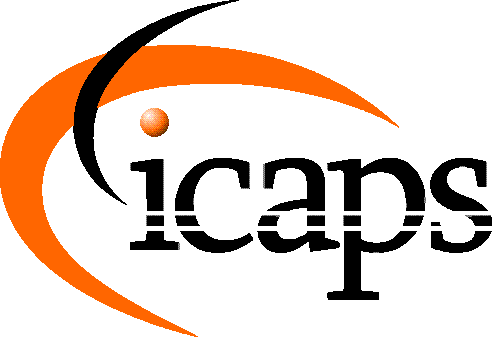

19th International Conference on
Automated Planning and Scheduling
September 19-23, 2009, Thessaloniki, Greece
https://icaps09.icaps-conference.org
Doctoral Consortium
(Call for Doctoral Consortium Papers in txt, pdf - outdated)
Opinion Survey
If you are a DC student, please spend a few minutes to go through this opinion survey.
Proceedings
New! The doctoral consortium proceedings are now online (3.82MB).
Program
The DC program consists of two events:
A) DC meeting on September 19th (whole day). This meeting comprises short oral presentations, activities in themed-cluster working groups and meetings with mentors. More particularly, the schedule for this day is:
| 09:00-09:30 | Introduction amphitheater 9 |
| 09:30-10:30 | Themed-cluster
working groups. Each student will have 15 minutes for
oral presentation. amphitheaters 9, 8, 7, 5 and 4 for clusters 1, 2, 3, 4 and 5 respectively |
| 10:30-11:00 | Coffee break |
| 11:00-12:30 | Themed-cluster
working groups - mentoring activity amphitheaters 9, 8, 7, 5 and 4 for clusters 1, 2, 3, 4 and 5 respectively |
| 12:30-14:00 | Lunch break |
| 14:00-14:30 | Invited talk by Subbarao Kambhampati:
How to write a research paper (and not to die trying it). amphitheater 9 |
| 14:30-15:30 | Themed-cluster
working groups. Preparation of a roadmap for the final
global debriefing amphitheaters 9, 8, 7, 5 and 4 for clusters 1, 2, 3, 4 and 5 respectively |
| 15:30-16:00 | Coffee break |
| 16:00-17:30 |
Final global debriefing (all DC students). Each working
group will have 15 minutes for oral presentation |
| 17:30-18:00 | Conclusions amphitheater 9 |
B) DC poster session on Monday, September 21st, 15:30 to 16:45. This session comprises a poster session attached to the main ICAPS conference. More information about the size of the poster stands is available here.
Themed-cluster working groups & mentoring activities
There will be five clusters, organised as follows:
Cluster 1 (amphitheater 9)
|
Student |
Paper |
|
|
Andrey Kolobov |
Integrating Paradigms for Approximate Probabilistic Planning |
Daniel Bryce |
|
Marcello Cirillo |
A Human-Aware Robot Task Planner |
Daniel Bryce |
|
Omar Zia Khan |
Minimal Sufficient Explanations for Factored Markov Decision
Processes |
|
Cluster 2
( )
|
Student |
Paper |
|
|
Masahiro Ono |
Market-based Risk Allocation for Multi-agent Systems |
Federico Pecora |
|
Frederik Heger |
A Hybrid Assembly Task Planning System: Where Motion
Planning Helps Symbolic Planning Find Good Solutions For
Real-World Applications |
Federico Pecora |
|
Kartik Talamadupula |
Integrating a Closed World Planner and an Open World Robot |
Ari Jonsson |
|
Alexander Niveau |
Using Interval Automata to Represent Decision Policies with
Continuous Variables |
Ari Jonsson |
Cluster 3
(amphitheater 7)
|
Student |
Paper |
|
|
Xiaoxun Sun |
Efficient Incremental Search for Moving Target Search |
Adi Botea |
|
Jordan Thayer |
Revisiting Bounded Suboptimal Heuristic Search |
Adi Botea |
|
Hootan Nakhost |
Action Elimination and Plan Neighborhood Graph Search: Two
Algorithms for Plan Improvement |
Joerg Hoffmann |
|
Erez Karpas |
Learning to Combine Admissible Heuristics Under Bounded Time |
Derel Long |
Cluster 4
(amphitheater 5)
|
Student |
Paper |
|
|
Nir Lipovetzky |
Inference and Decomposition in Planning Using Causal
Consistent Chains |
T. Lee McCluskey |
|
Alan Lindsay |
Learning Policies to Exploit an Extended Domain Model |
Daniel Borrajo |
|
James MacGlashan |
Hierarchical Skill Learning for High-Level Planning |
Susana Fernández |
|
Shahin Shah |
An Investigation into Using Object Constraints to Synthesize
Planning Domain Models |
Daniel Borrajo |
Cluster 5
(amphitheater 4)
|
Student |
Paper |
|
|
Robert Effinger |
Dynamic Controllability of Temporally-flexible Reactive
Programs |
Andrew Coles |
|
Mauro Vallati |
An Automatically Configurable Portfolio-based Planner with
Macro-actions: PbP |
Andrew Coles |
|
Patrick Conrad |
Flexible Execution of Plans with Choice |
Angelo Oddi |
|
Melissa Liew |
Issues in Temporal Planning using Timed Petri Nets |
Angelo Oddi |
Doctoral Consortium chairs
-
Antonio Garrido, Universitat Politècnica de València, Spain
-
Eva Onaindia, Universitat Politècnica de València, Spain
Program Committee
- Daniel Borrajo, Universidad Carlos III (Spain)
- Adi Botea, NICTA (Australia)
- Ronen Brafman, Ben-Gurion University (Israel)
- Daniel Bryce, Utah State University (USA)
- Andrew Coles, University of Strathclyde (UK)
- Yannis Dimopoulos, University of Cyprus (Cyprus)
- Minh B. Do, Palo Alto Research Center (USA)
- Carmel Domshlak, Israel Institute of Technology (Israel)
- Fernando Fernández, Universidad Carlos III (Spain)
- Susana Fernández, Universidad Carlos III (Spain)
- Hector Geffner, Universitat Pompeu Fabra (Spain)
- Patrick Haslum, Australian National University (Australia)
- Malte Helmert, University of Freiburg (Germany)
- Joerg Hoffmann, SAP Research (Germany)
- Ari K. Jónsson, Reykjavík University (Iceland)
- Sven Koenig, University of Southern California (USA)
- Roman van der Krogt, University College Cork (Ireland)
- Ugur Kuter, University of Maryland (USA)
- Derek Long, University of Strathclyde (UK)
- Tim Lee McCluskey, University of Huddersfield (UK)
- Angelo Oddi, ISTC-CNR (Italy)
- Federico Pecora, Örebro University (Sweeden)
- Kanna Rajan, Monterey Bay Aquarium Research Institute (USA)
- Alessandro Saetti, Università degli Studi di Brescia (Italy)
- Oscar Sapena, Universidad Politécnica de Valencia (Spain)
- Gérard Verfaillie, ONERA, Centre de Toulouse (France)
- Petr Vilim, ILOG (Czech Republic)